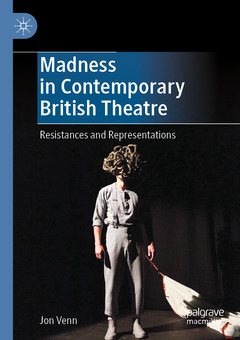Madness in Contemporary British Theatre, 1st ed. 2021 Resistances and Representations
Auteur : Venn Jon

This book considers the representation of madness in contemporary British
theatre, examining the rich relationship between performance and mental health,
and questioning how theatre can potentially challenge dominant understandings
of mental health. Carefully, it suggests what it means to represent madness in
theatre, and the avenues through which such representations can become
radical, whereby theatre can act as a site of resistance.
Engaging with the heterogeneity of madness, each chapter covers different
attributes and logics, including: the constitution and institutional structures ofthe contemporary asylum; the cultural idioms behind hallucination; the means by
which suicide is apprehended and approached; how testimony of the mad person
is interpreted and encountered.
As a study that interrogates a wide range of British theatre across the past 30
years, and includes a theoretical interrogation of the politics of madness, this is
a crucial work for any student or researcher, across disciplines, considering the
politics of madness and its relationship to performance.
Chapters
1. Introduction
2. Psychiatric Power in the Contemporary Asylum: The Diagnostic Gaze and the Practical Critique
2.1 Introduction
2.2 Seeing Patriarchy and Seeing Madness in Sarah Daniels’ Head-Rot Holiday
2.3 Diagnosis through Language and Race in Joe Penhall’s Blue/Orange
2.4 The Dispersed Mad Body in Lucy Prebble’s The Effect
2.5 Conclusion
3. Hearing Voices, Seeing Visions: Hallucination, Space, and Mad Experience
3.1 Introduction
3.2 Uncertain Meanings and the Family in Ridiculusmus’ The Eradication of
Schizophrenia in Western Lapland
Churchill’s The Skriker 3.4 Smoke in your Eyes: Spaces of Hallucination, Intersectionality, and Invisible
Violence in debbie tucker green’s nut
3.5 Conclusion
4. Other Lives and Radical Perspectives: Witnessing the Suicide, Witnessing the Mad
4.1 Introduction
4.2 Victim, Perpetrator, Bystander: Seeing the Witness in 4.48 Psychosis
4.3 What’s my Motivation? The Implications of Engagement in David Greig’s
Fragile
4.4 Ghosted Autopsies in Analogue’s Beachy Head
4.5 Conclusion
5. Madness and the Ethical Encounter in Autobiographical Performance
5.1 Introduction
5.2 The Uncertain Hand in James Leadbitter’s Mental
5.3 Confession of an Expert: Peas and Comedy in Bobby Baker’s How to Live
5.4 The Obscured Face of the Volunteer in Bryony Kimmings’ and Tim Grayburn’s
Fake It ‘Til You Make It
5.5 Conclusion
6. Conclusion
Dr. Jon Venn works as Teaching Fellow in Drama at the University of Birmingham, UK. His research interests include contemporary British theatre, the politics of madness, and critical suicide studies. His work has appeared in The Cambridge Companion to Theatre and Science and the Journal of Interdisciplinary Voice Studies.
Provides a much needed consideration of the relationship between madness and performance
Tackles close readings of key plays by writers such as Sarah Kane, Lucy Prebble, and debbie tucker green
Considers how theatre as a form can offer radical possibilities in our social imaginations of madness
Date de parution : 09-2022
Ouvrage de 222 p.
14.8x21 cm
Date de parution : 08-2021
Ouvrage de 222 p.
14.8x21 cm


